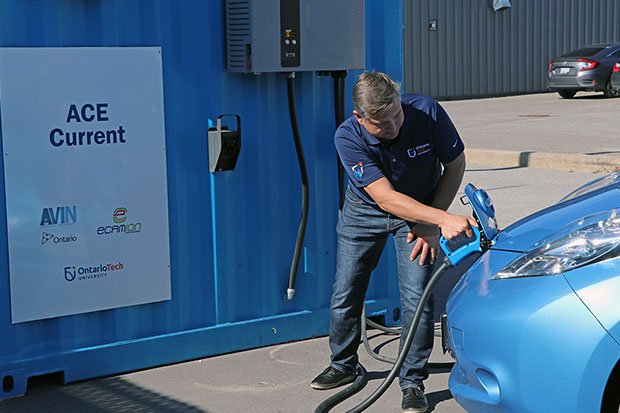Leading the charge: Ontario Tech, ACE and eCAMION test how to power autonomous vehicles
October 17, 2019

If you think rapid changes in technology defined the whirlwind first two decades of the 21st century, buckle your seatbelt: here come the 2020s.
One of the biggest changes you can expect in the next decade is the rise of autonomous vehicles (AV). The road to full vehicle autonomy gets clearer every day as the industry fast tracks AV testing and evaluates market opportunities for consumers.
Companies like Uber, for example, are investing heavily in the development of driverless vehicles and ‘mobility as a service’ (MaaS). Perhaps mass transit will one day be on par with ‘MaaS transit’.
But full AV capability requires the ability to re-fuel or re-energize AVs without the need for human interaction. It doesn’t make much sense if a regional team is needed to ensure someone can plug in AVs when the fleet needs charging. True autonomous functionality requires an autonomous AV charging system. That’s where Ontario Tech University, ACE, Canadian advanced-energy storage and charging leader eCAMION, and Ontario’s Autonomous Vehicle Innovation Network (AVIN) enter the picture.
Testing North America’s first autonomous AV charging platform
Recognizing the opportunity for autonomous charging, eCAMION is collaborating with AVIN’s Durham Regional Technology Development Site (RTDS) at ACE. Developing end-to-end energy storage and fast-charging electric vehicle technology at its Scarborough, Ontario headquarters, eCAMION is currently deploying charging stations across the Trans-Canada Highway and around North America.
In partnership with Durham RTDS electrical engineers and technicians, along with Ontario Tech’s expert faculty, eCAMION is testing and evaluating its AV charging test platform based on a robotic arm rail system needed to reach charging location(s), along with space requirements. A mechatronics engineering researcher from Ontario Tech is assisting with developing the required precision control of the Autonomous Charging Test Bed.
Outcomes and future directions
- The autonomous charging platform allows eCAMION to demonstrate and evaluate the first commercial deployments of a number of its technologies.
- The Durham RTDS provided eCAMION with a troubleshooting environment to identify required design changes and ensure the reliability requirements of future customers.
- The eCAMION-Durham RTDS partnership has introduced a number of potential new regional partners and led to possible future connections in Manitoba, Alberta and Michigan.
- New proposals in development could pave the way for eCAMION to become a market leader in autonomous vehicle charging systems.
Testimonial
“The partnership with Ontario Tech through the AVIN RTDS program has created new opportunities for us to accelerate the development and commercialization of new charging technologies for autonomous vehicle applications. The ACE team has worked hand-in-hand with our technical staff to install, commission and test one of the first systems of its kind that will be used to develop new autonomous charging systems. This partnership was key to moving us into an exciting new market opportunity for us and we hope to continue to build upon the success of all the great work we’ve done together so far.”
-Carmine Pizzurro, Founder and CEO, eCAMION
Media contact
Bryan Oliver
Communications and Marketing
Ontario Tech University
905.721.8668 ext. 6709
289.928.3653
bryan.oliver@ontariotechu.ca



